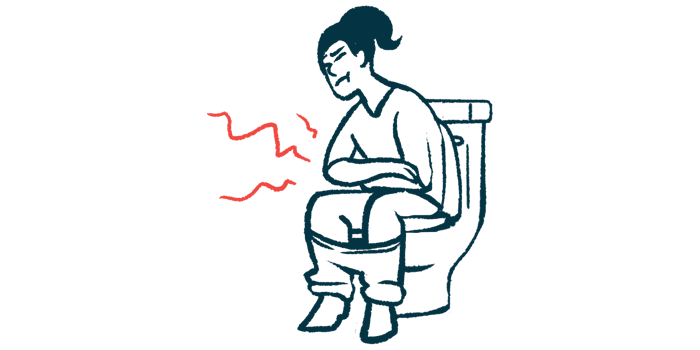GI symptoms linked to disease activity in spondyloarthritis
New findings also highlights ties to psychological issues like depression
Written by |

Two-thirds of adults with spondyloarthritis (SpA), a family of related inflammatory conditions that includes ankylosing spondylitis (AS), reported at least two symptoms related to the gastrointestinal (GI) tract, according to the findings of a new study.
About half of SpA patients also reported depression, which significantly correlated with increased disease activity, greater functional impairment, and worse GI symptoms.
“This study highlights the association between GI and psychological symptoms with disease activity and functionality in SpA patients,” the researchers wrote. These findings, the team also noted, support the need for “interdisciplinary management to address both GI and psychological symptoms in SpA.”
The study, “Impact of gastrointestinal and psychological symptoms on disease activity and functional impairment in patients with spondyloarthritis: a cross-sectional study,” was published in the journal BMC Rheumatology.
Symptoms include pain, inflammation in spine and joints
Spondyloarthritis, or SpA, is a family of closely related diseases that share common features, primarily arthritis, or inflammation and pain, in the spine and other joints. These conditions are grouped into two overlapping categories: axial and peripheral spondyloarthritis.
Axial spondyloarthritis, marked by pain and arthritis in the spine and hips, comprises two forms: AS and non-radiographic axial spondyloarthritis. Peripheral spondyloarthritis affects the peripheral joints, such as the elbows, wrists, fingers, knees, and ankles, and includes psoriatic arthritis and reactive arthritis.
According to the researchers, the lack of mobility, stiffness, and fatigue as a result of SpA can lead to psychological difficulties, including anxiety and depression, which may negatively affect quality of life.
In addition to joint inflammation, some SpA patients report symptoms related to the GI system, such as abdominal swelling and pain, diarrhea, blood in the stool, and weight loss. These symptoms can arise without signs of inflammatory bowel disease (IBD), a group of conditions characterized by inflammation of the GI tract, the team noted.
“Few studies have evaluated psychological symptoms and GI symptoms simultaneously in SpA patients without IBD,” the researchers wrote.
Axial spondyloarthritis was most common type, seen in 80%
For this study, a team of researchers in Colombia enrolled 98 adults with SpA who did not have IBD. Slightly more than half were men and most (80%) had axial spondyloarthritis. A total of 7.8% each had psoriatic arthritis or reactive arthritis. Undifferentiated SpA, meaning the patients did not meet the diagnostic criteria for AS or related conditions, affected 4.7%.
About two-thirds of patients reported at least two GI-related symptoms the previous month, most frequently abdominal pain and bloating, food intolerance, and diarrhea. Fatigue was present in 59% of patients, and weight loss was present in 20%.
These findings underscore significant region-specific GI involvement in SpA, highlighting the need for further investigation.
In a GI tissue analysis, performed to rule out IBD, most patient samples showed abnormalities, mainly in the small intestine, where inflammatory patterns (36%), structural changes (39%), and chronic inflammation (33%) were prominent. Inflammatory patterns were also noted in about a quarter of colon samples and rectal samples.
Those with at least two GI-related symptoms had higher disease activity, as assessed by the Bath AS Disease Activity Index and the AS Disease Activity Score C-reactive protein. Based on the Bath AS Functional Index, these patients also experienced greater functional impairment.
“These findings underscore significant region-specific GI involvement in SpA, highlighting the need for further investigation into its [disease] mechanisms and clinical implications,” the team wrote.
Of the 91 patients who completed the Patient Health Questionnaire-9, about half (46.7%) had depression, which was moderate to severe in 25%. Perceived helplessness and a lack of self-efficacy, as indicated by the Perceived Stress Scale (PSS-10), also affected at least half of the 90 patients assessed.
In a statistical analysis, depression, particularly moderate or severe depression, perceived helplessness, and lack of self-efficacy significantly correlated with high disease activity and impaired functionality. There was also a correlation between the number of GI symptoms and depression severity, with more GI symptoms related to more severe depression. The team noted that mild depression was predominantly seen in men with at least two GI symptoms.
A multiple correspondence discriminant analysis, to examine multiple correlations at the same time, confirmed the significant relationship between disease activity, depression, and GI symptoms.
“These results suggest a relationship between GI and mental health symptoms in individuals with SpA,” the researchers wrote. “Further longitudinal [over time] studies are essential to better understand the directionality of this relationship and to develop targeted interventions that address both GI and psychological symptoms in SpA patients.”







